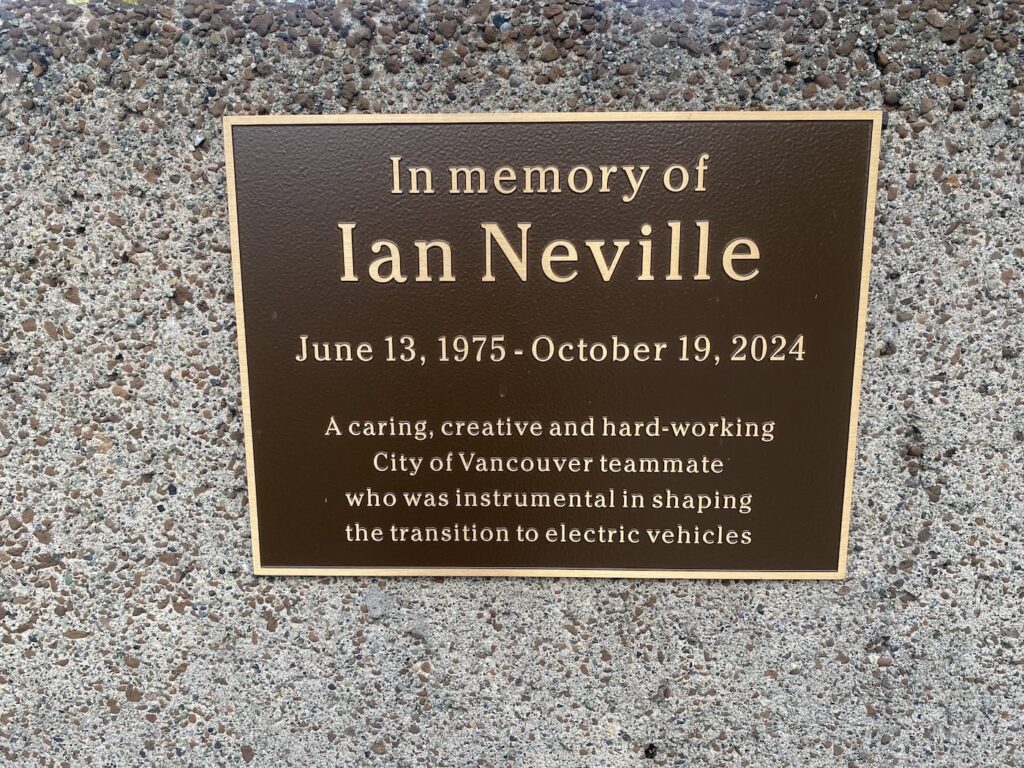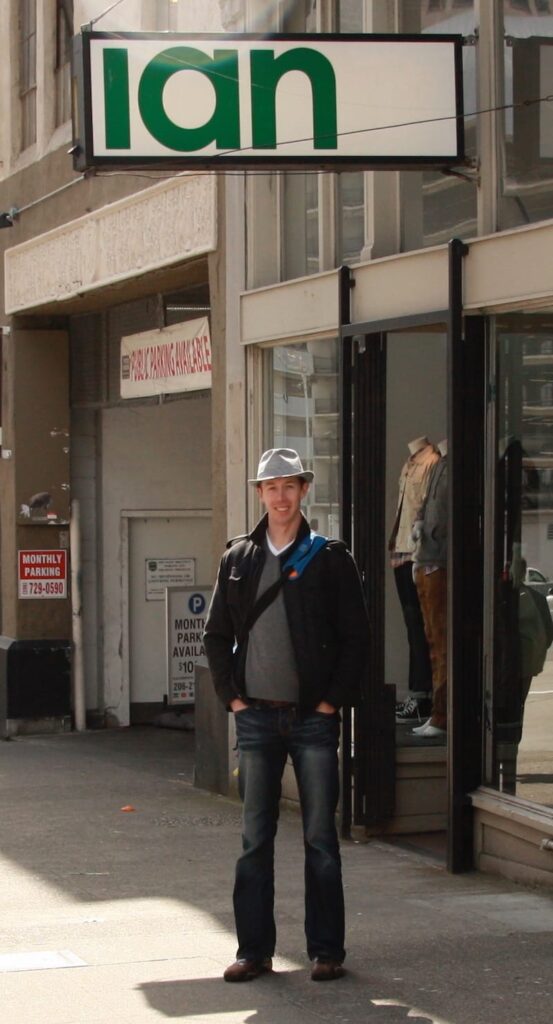October 19 marked one year since Ian Neville, senior sustainability analyst at the City of Vancouver, died from pancreatic cancer at age 49. Electric Autonomy commemorates the life and contributions of one of Canada’s most influential electric vehicle advocates

October 19 marked one year since Ian Neville, senior sustainability analyst at the City of Vancouver, died from pancreatic cancer at age 49. Electric Autonomy commemorates the life and contributions of one of Canada’s most influential electric vehicle advocates
In July, a modest rectangular plaque was mounted on a low exterior wall on the second level outdoor parking deck at Vancouver City Hall. It’s not visible from the street, but if you pull in to use the fast chargers on the east side of the lot, you can’t miss it.
“In memory of Ian Neville,” it reads. “A caring, creative and hard-working City of Vancouver teammate who was instrumental in shaping the transition to electric vehicles.”
Such tributes are typically saved for the people elected to run city hall, not the municipal employees inside. But after Neville died last year on Oct. 19, at age 49, leaving his wife Jennifer and teenage daughter Cameron, his co-workers raised funds and got city council’s approval to make sure he was recognized.
“His passing hit us really hard here at the city,” says Matt Horne, the city’s climate policy manager, who was Ian’s supervisor since 2017. “I think everyone on our sustainability team, whether they worked with him closely or not, really counted him as a friend.”

As for the wording on the plaque?
“Pretty much every EV charger in Vancouver you can trace back to Ian in some way,” says Horne.
The same could be said for a lot of EV chargers and much of the municipal EV policy landscape across Canada.
A champion for EV adoption
Neville, who was born in Ontario, but made his home in B.C. after attending the University of British Columbia, joined the City of Vancouver’s climate policy team in 2013. Soon after, he authored the city’s EV Ecosystem Strategy, then championed its implementation for almost a decade. In that span, Vancouver built the largest urban EV charging network in Canada and established itself as a leader in municipal electric vehicle policy and implementation — including the move in 2018 to require 100% EV-readiness in all new residential construction.

Municipal planners and policymakers around the province, across Canada and throughout North America have since modeled their work on, or been influenced by, Vancouver’s example.
“Of all of Ian’s initiatives, I think probably the one that he would have been most proud of would have been the readiness requirements,” says Horne.
Neville was also personally supportive of colleagues, eagerly sharing his advice, knowledge and enthusiasm for EV adoption and sustainable transportation of all kinds — both one-on-one and at conferences and in other industry and policy forums.
“Legend” and “lovely human”
From 2014 to 2017 Neville co-chaired the Urban Sustainability Directors Network’s Electric Vehicles User Group. He also served one year as co-chair of Electric Mobility Canada’s Municipal Working Group.
Comments from friends and colleagues when his obituary was posted on LinkedIn fell into two categories — those describing him as a “passionate electrification advocate” and “a legend in the space” and those who remembered him as “a lovely human.”
Along with his city-level work, he was also an advisor and advocate on provincial matters, including B.C.’s Zero-Emission Vehicles Act, first passed in 2019. He also collaborated with the team responsible for creating and maintaining Emotive, an EV information portal for consumers operated by Plug In BC.

“Ian was earnest, and when he put his mind to doing something, he did it well,” says Jennifer Neville in an email. “He was a natural athlete (steeplechase, running, skiing and mountain biking). He was a passionate environmentalist, and he always had time to share his thoughts and experience on electric vehicles.”
At Electric Autonomy, we benefited from Neville’s insights and encouragement through his participation as a member of our Editorial Advisory Board, starting in 2019. He was also a trusted source for our reporters, lending his insights to stories on such topics as the right-to-charge, EV accessibility and affordability, and EVs and climate policy.
Inspirational legacy
Neville’s concern for his local community was also reflected in his volunteer work. For a number of years, he served as a homeless count volunteer for the city. After he was diagnosed with pancreatic cancer in 2023, he also helped raise money for cancer research. As noted in his obituary, just a few months before he died, having undergone nearly a year of chemotherapy, “he led a team of supporters [in the Ride to Conquer Cancer] to the top of Cypress Mountain.”
It was the same spirit of leadership through action that he brought to the EV transition, a legacy that continues to be an inspiration to the team at Electric Autonomy and many others in the EV community and beyond.
“He was passionate for all forms of sustainable transportation,” says Horne. “His role at the city was very EV-focused, but his personal passions and how he wanted to see the change encompassed a much broader view of sustainability and how he could help make the city a better place.”

Those wishing to honour Ian’s memory are invited to make a donation to BC Cancer or the North Shore Mountain Bike Association (NSMBA), two causes close to his heart.






